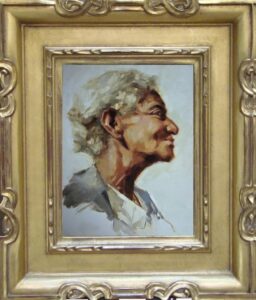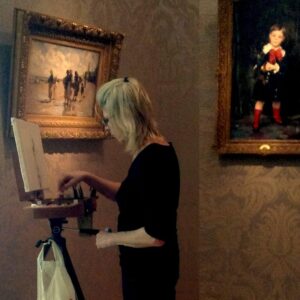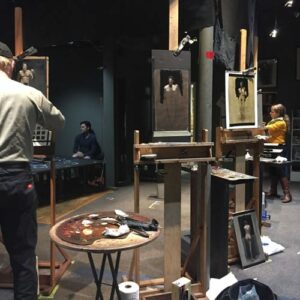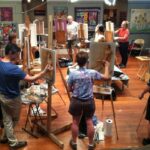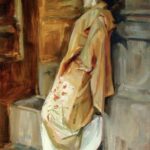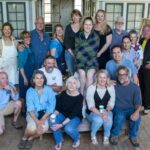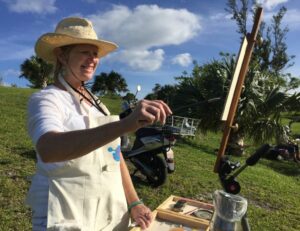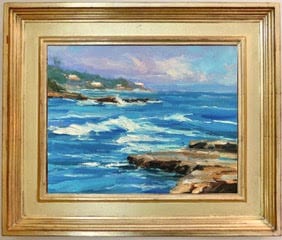
Let me begin by saying that 2018 was the most challenging year of my life. Through a series of mind-expanding experiences and difficult decisions, I made some big changes. The brain is a very flexible tool. A curious phenomenon takes place when we venture beyond our limitations. It’s like pulling the cord on an inflatable life raft – once expanded it’s hard to shove it back into its original shape.
“Realism is not based on the way things are, but upon things as you see and feel them”
– Charles Woodbury

View of Elbow Beach, Bermuda 
At Gallery One Seventeen, Hamilton Bermuda
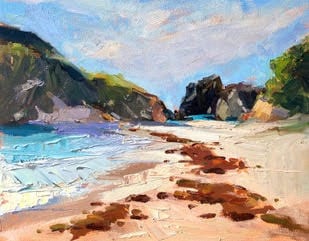
Elizabeth Gilbert once said that the best gifts she’d ever received were questions she couldn’t dodge. Good questions are better than good answers, in that they give us purpose. I’m basically a pleasure-centered person, the fear of being uncomfortable is a very palpable thing. But I went in search of something beyond the life I’d known. My fear of failure was overshadowed by the realization that life is a gift, we have to make the most of it and not waste a moment. I took a leap of faith and let the universe direct me with a trust in the knowledge that I’m not in the driver’s seat as much as I’d like to believe.
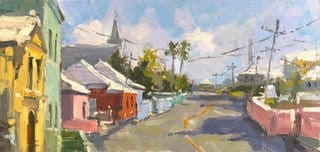
“It’s easier to paint the angel’s feet in another’s masterwork than to discover where the angels live within yourself.”
– Art and Fear
In many ways the creative process is a metaphor for life: it’s letting go of fear, trusting in our abilities, and accepting our “mistakes” with patience. It’s also about asking tough questions. It’s problem solving on a visual level and the reality that painting is not a mindless escape. It takes a highly evolved, series of mental maneuvers to create a great work. That being said, believing that every painting you make must be absolutely perfect is an unrealistic goal. You’re never going to achieve it, so you become too scared to even try. Instead of aiming for perfection, strive for every painting to teach you something and learn from your mistakes.
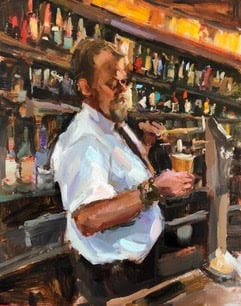
by Eli Cedrone
I spent a lot of time in Bermuda over the past year, teaching and painting. The most satisfying thing about teaching is that I get to help people step outside of their comfort zones and stray from their intellectual neighborhoods long enough to learn something new. The first challenge is to break down the psychological barrier that you must be born with the ability to draw or paint. Art is a universal language and it is so because it’s the expression of the feelings of all people. The word ‘truth’ is often used in the discussion of painting. It speaks of the creative process as a soulful act. The power of seeing the world in the most truthful of ways requires extraordinary intuition, an insight into subjects which are dark to ordinary vision. Creativity is about engaging with the world and awakening an emotion in ourselves and in the minds of others.
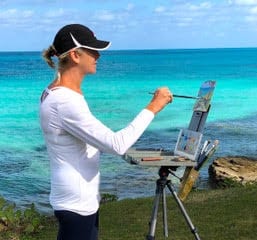
“Have no fear of perfection – you’ll never reach it”
– Salvador Dali
One of the most talented artists I’ve had the pleasure to meet was Nancy Guzik (married to Richard Schmid, another huge influence). While painting together on a cold winter day in Brattleboro, Vermont she compared the process of painting to a horse race. It’s important to pace yourself; lay in a good foundation, maneuver through the painting with confidence and skill and hold back till the finish line is in sight. This resonated with me because as in life, I lack patience and want to get to the good stuff first. The creative process does not come easy, it takes real effort to move beyond mediocrity. As is the case with professional athletes, musicians and great artists, this “ease” comes from years of hard work and practice. Our ego wants it easy. In reality nothing worth doing ever is.
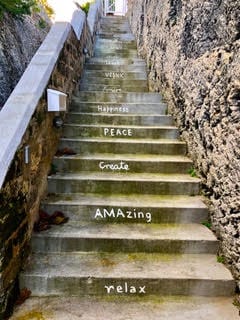
I hope you’ll join me for a workshop in 2019. Visit www.elicedrone.com for my workshop schedule



